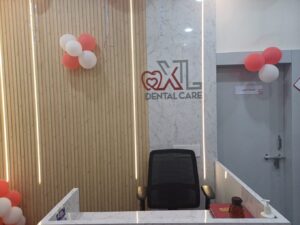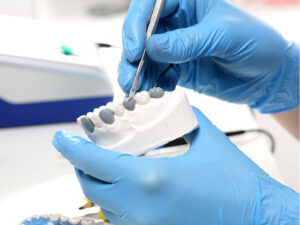Gentle & comfortable wisdom tooth removal
Addressing complications associated with the eruption of the third molars
What is Wisdom Teeth Removal
Wisdom teeth removal, also known as third molar extraction, is a surgical procedure aimed at removing one or more of the four wisdom teeth, located at the back of the mouth. These teeth typically emerge between the ages of 17 and 25, but they can often cause complications due to insufficient space in the mouth.
Causes for Wisdom Teeth Removal:
- Impaction: Wisdom teeth may become impacted if they do not have enough room to emerge properly, causing them to grow at an angle or remain trapped beneath the gum line.
- Crowding: Wisdom teeth can exert pressure on adjacent teeth as they try to emerge, leading to misalignment or crowding of the teeth.
- Infection: Partially erupted wisdom teeth can create pockets of bacteria and debris, increasing the risk of infection and inflammation known as pericoronitis.
- Cysts or tumors: In rare cases, wisdom teeth may develop cysts or tumors, which can cause damage to surrounding teeth and bone tissue.
Consultation:
During the consultation for wisdom teeth removal, the oral surgeon or dentist will:
- Perform a thorough examination of the mouth and jaw, including X-rays or CT scans to assess the position and condition of the wisdom teeth.
- Discuss the patient’s medical history, including any underlying health conditions or medications that may affect the procedure or recovery.
- Develop a personalized treatment plan based on the findings of the examination and the patient’s specific needs and concerns.
Available Treatments:
The wisdom teeth removal procedure typically involves the following steps:
Anesthesia: Local anesthesia, sedation, or general anesthesia may be used to ensure the patient’s comfort during the procedure.
Extraction: The oral surgeon or dentist will make an incision in the gum tissue to access the wisdom tooth and may need to remove bone tissue to extract the tooth fully.
Closure: The surgical site is cleaned, and stitches may be placed to promote healing.
Recovery: The patient is monitored in the recovery area until the effects of anesthesia wear off, and post-operative instructions are provided.
Aftercare:
After wisdom teeth removal, it’s essential to follow your dentist’s instructions for aftercare, which may include:
- Applying ice packs to reduce swelling and discomfort in the first 24-48 hours after surgery.
- Taking prescribed medications, such as pain relievers or antibiotics, as directed.
- Eating soft foods and avoiding strenuous physical activity during the initial healing period.
- Practicing good oral hygiene by gently rinsing with warm saltwater and avoiding vigorous brushing or flossing near the surgical site.
Advantages of Wisdom Teeth Removal:
- Prevention of complications: Removing impacted or problematic wisdom teeth can help prevent complications such as infection, crowding, and damage to adjacent teeth.
- Pain relief: Wisdom teeth removal can alleviate discomfort caused by impaction, inflammation, or infection.
- Improved oral health: By removing wisdom teeth that are difficult to clean or maintain, overall oral health and hygiene can be improved.
Disadvantages of Wisdom Teeth Removal:
- Potential risks: Like any surgical procedure, wisdom teeth removal carries some risks, including bleeding, infection, nerve damage, and dry socket (a painful condition where the blood clot at the extraction site becomes dislodged).
- Recovery time: Recovery from wisdom teeth removal can vary depending on factors such as the complexity of the procedure and individual healing ability, with some patients experiencing swelling, discomfort, and restricted diet for several days to weeks post-surgery.
Photos:
Wisdom Teeth Removal FAQ
Recovery typically takes about 1-2 weeks, although individual experiences may vary. Most patients can resume normal activities within a few days, but strenuous exercise and certain foods may need to be avoided until the surgical site has fully healed.
Not everyone will require wisdom teeth removal, but it is often recommended if the teeth are causing problems such as impaction, infection, or crowding. Your dentist or oral surgeon can assess your specific situation and recommend the appropriate course of action.
Depending on the patient’s individual circumstances and the complexity of the procedure, all four wisdom teeth may be removed during a single surgical appointment, or the removal may be staged over multiple appointments.
Conclusion:
Wisdom teeth removal is a common dental procedure aimed at addressing complications associated with the eruption of the third molars. While the decision to undergo wisdom teeth removal should be based on individual needs and concerns, the procedure can often prevent future oral health issues and alleviate discomfort. If you’re experiencing symptoms such as pain, swelling, or difficulty opening your mouth due to wisdom teeth, consult with your dentist or oral surgeon to discuss whether wisdom teeth removal is right for you.
Services
Specialists







